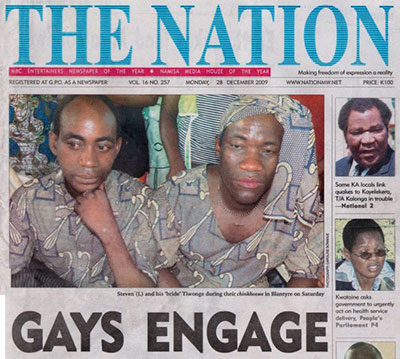COURT TO REVIEW SODOMY LAW

Steven Monjeza and Tiwonge Chimbalanga made international headlines when they were tried under Malawi’s sodomy laws in 2010.
In a surprising – and potentially game-changing – step, the Malawi High Court has decided to review the constitutionality of the country’s ‘sodomy’ laws, which criminalise consensual sexual activity between individuals of the same sex.
Announced in an advert in the Nation newspaper, the landmark move to review the cases of three individuals, who were convicted and sentenced under Malawi’s homophobic laws in 2010, could lead to the repeal of the infamous section 153(a) of the Penal Code – if the judges rule that it is unconstitutional.
Remarkably the High Court made the decision by “exercising its own jurisdiction under the constitution and the Courts Act”.
And just as remarkably, the Court has issued an open call to all interested parties – ‘such as the Malawi Law Society, the Malawi Human Rights Commission, civil society organisations (local and international), religious groupings and individuals – to apply to join the matter as amici curias.
It is impossible to guess which way the Court will rule when it sits to consider the matter on December 2nd but the fact that it is even debating the constitutionality of the venal sodomy laws represents a step forward for the rights of sexual minorities.
Needless to say the public debate in the run-up to the Court’s sitting – and after it whichever way the judges rule – will be filled with the usual bile and vicious, religiously and culturally inspired anti-gay rhetoric.
But the judges are not politicians, who have to worry about the forthcoming election, so there is a chance that they will rule the sodomy laws unconstitutional.
And while this will not end discrimination and homophobia overnight in Malawi, it will send a very clear signal that everyone enjoys the same human rights – and it will remove the fear of arrest and imprisonment from people who happen to love someone of the same sex.
Open Society Initiative for Southern Africa (OSISA)
Leave a Reply